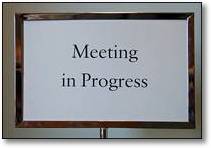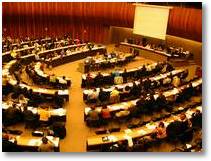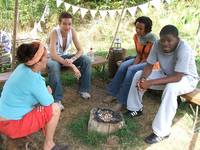[Summary: why should you be involving young people? – And once you know your reasons – what impact do those reasons have on the nature of their involvement?]
Can you hold an event about children and young people without children and young people being there?
 Well, of course you can, but should you? Many people in youth participation might say young people must be involved in all events about them – the idea that from a young person's perspective 'You can't talk about us without us'. Personally I think we should start from an assumption that young people should be involved, and should have to argue against it if neccessary, rather than always having to argue for young people's involvement. However, when we do argue for young people's involvement – the reasons we give for youth involvement matter – and have an impact on the selection of young people to be involved and the role they should play.
Well, of course you can, but should you? Many people in youth participation might say young people must be involved in all events about them – the idea that from a young person's perspective 'You can't talk about us without us'. Personally I think we should start from an assumption that young people should be involved, and should have to argue against it if neccessary, rather than always having to argue for young people's involvement. However, when we do argue for young people's involvement – the reasons we give for youth involvement matter – and have an impact on the selection of young people to be involved and the role they should play.
Below I'll offer three candidate reasons for involving young people – and I'll sketch out what I think their upshot might be for the nature of young people's involvement that is suitable in a particular context. This is very much a work in progress, and should not be taken as a definitive set of views:
Three reasons for involving young people and their practical consequences…
1) To address the oppression of young people: rights and justice
Far too often young people are excluded either simply because they are young or because their preferred methods of working and communicating do not fit neatly into formal 'adult' structures.
Many of the decisions that are taken about young people's lives do not involve them. Where adults can often take control and reject decisions they do not agree with – young people often do not have such opportunities.
Young people have a right under Article 12 of the UN Convention on the Rights of the Child to be involved, listened to, and to have their views taken into account – in decisions that affect them.
If we are serious about tackling the general exclusion and oppression of young people – and the particular exclusion of some groups of young people – we have to lead by example and to include young people as partners in all we do.
The Upshot
 Recruit young people most affected by the decisions you are making.
Recruit young people most affected by the decisions you are making.
Provide extensive support for these groups and design inclusive processes throughout your events and engagement that bring adults and young people onto a 'middle ground' where they can work together.
Young people participate as 'experts by experience' in their own lives.
The process should test adult ideas against young peoples concrete stories about their own lived experience.
If it is tricky for a particular group to participate directly – support other young people (see Reasons 2) to act as advocates on their behalf.
2) Making better decisions: prudential and practical
What may sound like the idea solution from an adult's perspective may not be from a young person's perspective because:
1) It's very tricky to remember what it is like to be young and undergoing rapid processes of cognitive, physical, social and emotional development;
2) Youth is a rapidly changing social phenomena – and the norms and practices which should govern 'interventions' in young people's lives need to be constantly renegotiated with young people now;
3) It's a very different picture from the 'inside' as opposed to from the 'outside' – and the dynamics of how a politic of programme is implemented could make or break it;
Involving the voice, views, responses and ideas of young people will enable us to make better policy and implement better practice in better ways.
The Upshot
Recruit a diverse group of young people with an understanding of the decisions and issues you are working on.
Provide training and support for young people to understand the processes you are working through and the challenges you are facing. Seek to make the processes you are working through as accessible as possible (e.g. avoid jargon, use visual methods, keep things to the simplest level you can whilst still engaging with the complexity of the challenges you face).
Young people participate as those offering 'insights' into the contemporary lived experience of young people.
Work with these young people as partners and 'critical friends' helping to develop your idea further.
OR (Combining this with Reason #1)
Resource (offer training, teambuilding time etc.) the group of young people you are working with and actively hand power over to them. For example, power to decide on funding and to act as commissioners or co-commissioners.
3) Developing fresh talent: forward looking and developmental
 Creativity is not something people learn, it something they are trained out of.
Creativity is not something people learn, it something they are trained out of.
Providing opportunities for young people to participate addresses the inbuilt 'age discrimination' in the common 'seniority' requirements for participation in many conferences and formal processes.
Allowing young people to gain positive experiences in a formal arena of sharing their views, ideas, experience and innovation builds their capacity to be realistic and practical change makers in their own communities – linked into intergenerational networks that can support them to make a difference.
The Upshot
Recruit young people with existing skills and expertise in the area you are focussing on.
Offer them some additional support to understand the context and structure of the process they will be involved in – and offer opportunities for them to reflect on learning from the process.
Young people participate as equal partners in the process – with their voice no more or less listened to than anyone else present.
Summary:
So to return to the question in the opening: Can you hold an event about children and young people without children and young people being there?
I'd love to hear your thoughts…
There are 2 events with the theme of ‘engaging hard to reach young people’…
At event 1 there are 10 practitioners all who have successfully worked with a variety of hard to reach groups for over 10 years, and there are 5 people who have run exceptional projects with hard to reach groups for 20 years+
At event 2 there are 15 youth workers, none of who have been responsible for developing or running a project with hard to reach young people – however all of them have brought some young people with them.
If you want to learn how best to effectively engage hard to reach young people which will you choose?
I don’t disagree with any of the reasons given – but I do disagree with tokenism and I think that currently there is a lot of it.
I also have a problem with events and organisations that turn out the same ‘old’ young people and get the ‘young person thing’ covered that way! – Like these represent ‘any’ young person!
To me the real issue is discrimination. Its wrong for young people not to be involved because of their age. Its also wrong to be involved just because of their age. What should count is what they can contribute.
Of course ideally you want young people that can contribute at events – they’re much richer for it – but I don’t think events should be written off just because there aren’t some young faces. If you’re young and you have something to offer your age shouldn’t restrict you from attending (and this includes consideration to age related restrictions like the time of the week, costs & so on) – but just being young is not enough.
The other thing I dislike thats related to this is the ‘them’ & ‘us’ situation it creates – it devalues peoples opinions if they are above a certain age (and what age is that by the way?!) – what I’m interested in is people of all ages working together to find the best solutions for children & young people – your age does not matter – what you have to contribute does!
Really useful input Mike.
I think what I’ve tried to say about is: ‘age does matter’ – but we have to know why it matters in particular circumstances and we have to design involvement on that basis so that it is not tokenistic.
I also don’t think an event should be written off if there are no young faces. I think it should be questioned if the organisers haven’t even considered whether or not it is appropriate to engage young people inputting into the event or process in some way (which may not be through a physical presence…).
Hopefully the three reasons above emphasise exactly that it is wrong for an organiser to involve any young person just because of their age. It can be valid, under Reason #1, to involve someone just because they are a young stakeholder in the issue – as, being a stakeholder, their contribution should be valued.
I broadly agree that ‘your age does not matter, what you have to contribute does’ – until we set up and require ways of contributing (as I know YoMo does not, but many other settings do) which are, by their design, exclusive and difficult for young people to engage in. Then age does matter – we have to take specific efforts to redress that balance.
I agree – and yes like most things its about balance – the difficulty is that when the balance is wrong in the first place you have to put a bigger effort in to initially work towards having a balance (like on a seesaw!) – I think sometimes though people lose sight of seeking balance and go for an all or nothing approach.
I think you’re right though to try and shift the argument away from purely age considerations and instead value what people can offer and that their age shouldn’t discrimate from them being able to make that offer.
I enjoyed reading this – think you make the case for involving young people very clear. Of course there are difficulties around when to engage just as there are when it comes to any participation or engagement exercise.
The notion of giving real weight to input from young people as ‘experts by experience’ in their own lives is one that can’t be emphasised enough. A model for valuing experiential expertise can be seen in the NHS’ expert patients programme.
http://tinyurl.com/2rtxo5
I agree wholly with your comment that a process
“should test adult ideas against young people’s concrete stories about their own lived experience.”
It is now a case of getting that message of the value that this can offer across to policy makers.
An encouraging research approach involving young offenders can be found here: http://www.vrg.cf.ac.uk/